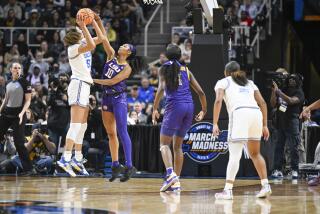Times Issues Ethics Guidelines for Reporters, Editors
The Los Angeles Times has issued a set of ethical guidelines designed to encourage the newspaper’s journalists to limit the unnecessary use of anonymous sources, avoid conflicts of interest and write in precise language.
The nine-page set of standards — sent to reporters and editors at the newspaper this week — comes not after a scandal, as at some other publications, but at a time when waning circulation and public trust in the news media have led many newspapers to codify their standards.
The Times previously has issued rules for reporters, but mostly in a hodgepodge of memos and directives — many of which were not available to everyone.
Now, all employees will be asked to review the guidelines, said Editor John S. Carroll.
“I think a code of ethics, written or commonly understood, has always been important for the long-term success of a paper,” Carroll said.
The guidelines were drawn up after more than a year of discussion by about a dozen of the paper’s reporters and editors.
One of the most immediate outcomes of the guidelines may be in stopping Times sportswriters from voting for a variety of honors and awards, including college football’s Heisman Trophy, college basketball’s John R. Wooden Award and membership in Major League Baseball’s Hall of Fame.
“In general, it is inappropriate for reporters to vote for awards and rankings,” the new ethics guidelines read. “Doing so could reasonably be seen as compromising their objectivity.”
Sports Editor Bill Dwyre said he planned to stop voting for those awards and expected his writers to follow suit, unless they had “an especially compelling reason for continuing to vote for something.”
In such instances, Dwyre said he would take the case to the newspaper’s managing editor, as outlined in the standards, and attempt to get an exemption.
“I don’t 100% agree or embrace the policy,” Dwyre said, “but I understand it.
“I voted for these things, hesitatingly at the start,” he said. “But the alternative is you have fans or coaches voting. I may not be perfect, but I’ll guarantee you that I am going to be considerably more objective than the fans and coaches, and understandably so.”
Dwyre noted the long-reported bias against West Coast players in voting for the Heisman, given each year to the top player in college football.
He said he and two other Times staff members currently joined sportswriters from around the country in voting for the award, and that their absence could turn the balloting even slightly more in favor of East Coast players.
“Should I care about that? Maybe not,” he said. “But, I guarantee you, there are plenty of fans who care.”
Carroll said in an interview that it was up to those giving the sports awards to find a way to guarantee the integrity of the voting.
“As far as I’m concerned, it’s the Heisman’s problem if it’s not a fair judge of football talent,” he said. “If it’s not a fair award, they ought to be able to figure out how to make that happen.”
Arguments in favor of voting to assure local players have a chance smack of boosterism, Carroll said, adding: “That’s not what we’re here for.”
The Times’ guidelines speak in broader terms and make fewer outright prohibitions than ethics standards issued recently by some other publications.
The standards say, for example, that anonymous sources can still be used, but only as a “last resort” to convey important information that cannot be delivered by other means.
Reporters are directed to try to be sure that sources have a compelling reason for keeping their identities secret. They should be identified in stories as precisely as possible to reveal potential biases, the guidelines suggest.
“An advisor to Democratic members of the House Foreign Relations Committee” would be a preferable identification for an unnamed source, the policy says, than simply “a congressional source.”
Although it does not refer to the recent case in which Time magazine reporter Matthew Cooper had his e-mails turned over to a federal prosecutor, the directive warns Los Angeles Times reporters to be “extremely circumspect about how and where they store information that might identify an anonymous source.”
Kelly McBride, head of the ethics faculty at the Poynter Institute, a St. Petersburg, Fla.-based school for professional journalists, praised The Times’ guidelines for recognizing “the new complexity reporters are faced with in reporting with anonymous sources.”
But she said many newspapers had found that the use of unnamed sources was “a habit that’s really hard to break.”
Newspapers that adhere to strict rules have to be prepared, at times, to be scooped by publications that are less restrictive of using information from unnamed sources, McBride said.
The guidelines go further than those of other newspapers to promote precise writing, McBride said — an acknowledgment that stories with a tone or point of view unjustified by the facts lose credibility with readers.
The guidelines urge Times writers, for example, not to use superlatives such as “biggest,” “worst” and “most” unless the terms can be proved.
“We live and work in a media environment suffused with hyperbole,” the standards say. “It is The Times’ intention to stand distinctly apart from that world and speak straightforwardly to readers.”
In a note to his employees introducing the new guidelines, Carroll noted that “misbehavior” by Jayson Blair of the New York Times and Jack Kelley of USA Today (who fabricated information in some of their stories) was known by some of their co-workers but “not passed along with due emphasis to the senior editors.”
The lesson, although sometimes difficult, Carroll said, is that “each of us is duty-bound to speak up about anything that threatens the paper’s integrity.”
More to Read
Start your day right
Sign up for Essential California for news, features and recommendations from the L.A. Times and beyond in your inbox six days a week.
You may occasionally receive promotional content from the Los Angeles Times.







